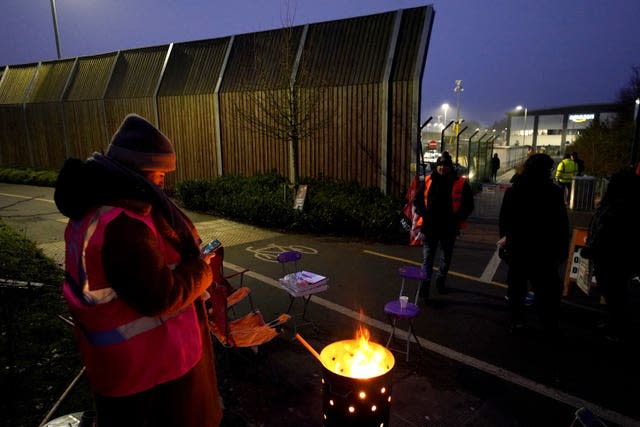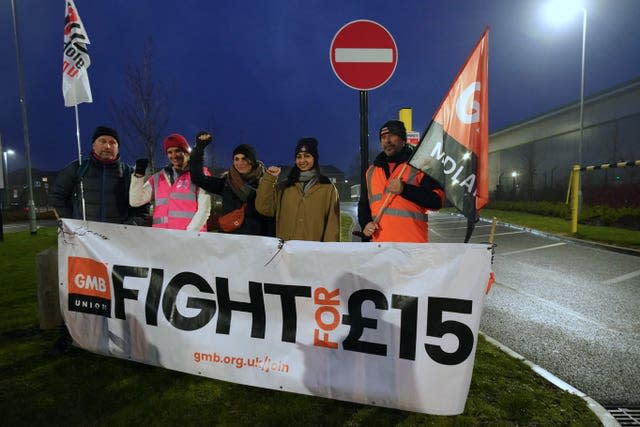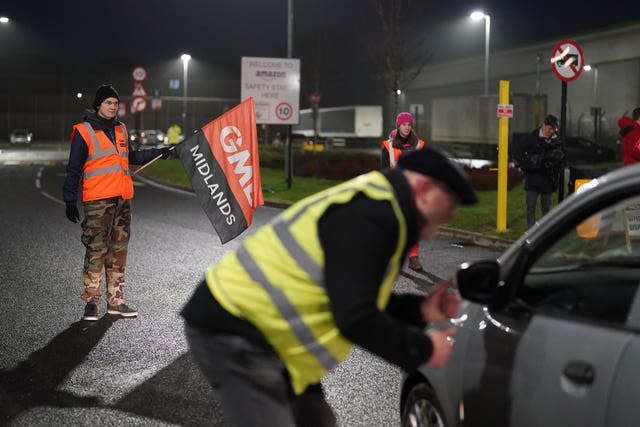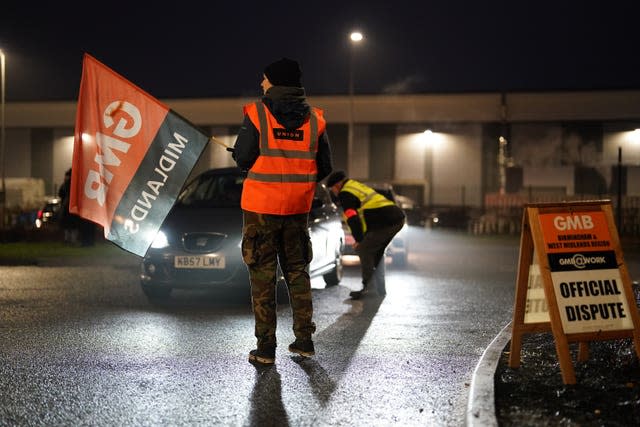Wed, 25 January 2023
Amazon workers at a warehouse in Coventry were striking over pay on Wednesday, the first time the e-commerce giant has faced industrial action in the UK.
The GMB union is calling on Amazon to pay its UK workers £15 an hour to bring their wages in line with their American counterparts, who earn $18 an hour.
Staff are unhappy with a pay increase of 50p pence per hour to £10.50, equivalent to a 5% rise and well below inflation. Amazon introduced the pay hike last summer. But warehouse workers say it fails to match the rising cost of living.
Stuart Richards, GMB senior organiser, said: “Today, Amazon workers in Coventry will make history.
Read more: Amazon to shut three UK warehouses putting 1,200 jobs at risk
“They’ve defied the odds to become the first ever Amazon workers in the UK to go on strike.
“They’re taking on one of the world’s biggest companies to fight for a decent standard of living.
“They should be rightly proud of themselves.
“After six months of ignoring all requests to listen to workers’ concerns, GMB urges Amazon UK bosses to do the right thing and give workers a proper pay rise.”
An Amazon spokesperson said: “A tiny proportion of our workforce are involved."
Amazon.com, Inc. (AMZN)
Victoria Scholar, head of investment at Interactive Investor, said: "Amazon employees are adding to the slew of worker walkouts across the UK in many industries as inflation eats away at take-home pay.
"In August, Amazon offered workers a measly 50p per hour pay increase. The two sides are in a stalemate with workers struggling with the cost of living crisis which is reaching boiling point, while Amazon has been trying to slim down its costs with little desire to increase them.
"While Amazon fared extremely well during the pandemic thanks to the e-commerce boom and surge in parcel deliveries, the return to physical stores post-COVID along with soaring inflation meant 2022 was a tough year for tech all round.
"Earlier this month CEO Andy Jassy said he was planning to axe around 18,000 jobs to weather the tough economic times, a move that has helped to instil confidence among investors, reflected by its shares which are up by more than 12% year-to-date in stark contrast to last year’s slide."
Amazon workers walk out in UK first for company’s staff in pay dispute
Amazon workers staging their first ever strike in the UK in a dispute over pay want a “decent standard of living”, a union has said.
Members of the GMB at the company’s fulfilment centre in Coventry voted to walk out on Wednesday in protest at a pay rise the union said is worth 50p an hour.
Amazon has said it already offers “competitive pay, comprehensive benefits, and excellent opportunities for career growth, all while working in a safe and modern environment”.
GMB senior organiser Stuart Richards said: “Today, Amazon workers in Coventry will make history.
“They’ve defied the odds to become the first ever Amazon workers in the UK to go on strike.
“They’re taking on one of the world’s biggest companies to fight for a decent standard of living.
“They should be rightly proud of themselves.
“After six months of ignoring all requests to listen to workers’ concerns, GMB urges Amazon UK bosses to do the right thing and give workers a proper pay rise.”
Amanda Gearing, also a GMB senior organiser, speaking from the picket line, said: “We’re here today because Amazon workers have said they’ve had enough.”
She said staff who worked through tough conditions during the pandemic are just “trying to get decent pay”.
“They (the centres) are pressure-cooker environments they work in, with the targets they’re expected to reach,” she added.
“They (Amazon) just wear them out, get rid of them, replace them.”
Ms Gearing added: “After all that, they have just offered a 50p pay increase in the biggest cost-of-living crisis that we’ve had in decades.
“I think, when the workers have got nothing to lose, you see them coming out fighting.”
She said the striking workers are “not militant” and “need a job”, adding: “Like I say, they’ve put up with the conditions in those centres for a long time.”
“Coventry has been open four years, we’ve had issues since it was open. Rugeley (Staffordshire) before that – they’re just horrendous places to work,” she claimed.
She said the main issue for workers is what she said are target-led performance measures, set by an “algorithm”.
“So, imagine turning up to work not knowing if you’re going to make the grade.
“If you don’t (hit targets) you end up in a disciplinary, so they’re just having to work, work, work, they’re not allowed to talk to people, it’s difficult to take a toilet break,” she claimed.
“In one of the other fulfilment centres, we were having people urinating in a bottle because they didn’t want to take the time out and go to the toilet because it becomes idle time.
“We’ve got injuries, we’ve got more ambulances coming to (this) site, than any other warehouses across the country, they’ve just got an appalling record when it comes to health and safety.
“I think we’ve been lucky there’s been no fatalities within those centres, up to now.”
An Amazon spokesman said: “Amazon is a safe place to work.
“The vast majority of ambulance call-outs to our buildings are related to pre-existing conditions, not work-related incidents, and as a responsible employer we will always call an ambulance if someone requires medical attention.
“That’s just sensible.”
Regarding toilet breaks, the company said: “You can use the toilet whenever you like.
“You can always go to the toilet when you like, log off, have a drink, speak to your manager etc – that’s not an issue.”
Ms Gearing said she is “hoping Amazon will get round the table”, while adding: “I don’t anticipate they’ll be giving me a call anytime soon.”
The company spokesman said: “Our employees have the choice of whether or not to join a union. They always have.
“We’ve made great progress in recent years and months in important areas like pay and safety.
“The fact is, we already offer competitive pay, comprehensive benefits, and excellent opportunities for career growth, all while working in a safe and modern environment.
“The unions know this.
It is understood that of about 2,000 staff at the Coventry site, 178 voted in favour of strike action.
The Amazon spokesman added: “A tiny proportion of our workforce are involved.
“In fact, according to the verified figures, only a fraction of 1% of our UK employees voted in the ballot – and that includes those who voted against industrial action.
“We appreciate the great work our teams do throughout the year and we’re proud to offer competitive pay which starts at a minimum of between £10.50 and £11.45 per hour, depending on location.
“This represents a 29% increase in the minimum hourly wage paid to Amazon employees since 2018.
“Employees are also offered comprehensive benefits that are worth thousands more – including private medical insurance, life assurance, subsidised meals and an employee discount, to name a few.”
UK Amazon workers strike in protest at 50p pay rise
Matthew Field
Wed, 25 January 2023
An epic day and a half of deals, Amazon Prime Day kicks off at midday on Monday 16th July and runs until midnight on Tuesday 17th July. Pictured at the Hemel Hempstead fulfilment centre, Amazon
Amazon workers on Wednesday started their first official UK strike action, walking out of the online retail giant's Coventry warehouse in protest against a 50p pay rise amid claims staff are "treated like robots".
Around 300 Amazon workers were expected to down tools and join picket lines. The strike action began at Amazon's Coventry centre at midnight on Tuesday
The 24-hour picket line was expected to take place outside Amazon's warehouse in Coventry.
The GMB union called for a walk-out after balloting members in December. The union is demanding an increase in pay from £10 to £15 per hour. Amazon has offered 50p per hour.
Union members told the BBC robots in the warehouses were "treated better than us".
Darren Westwood and Garfield Hilton said their work around the warehouse was tracked and monitored, adding that "idle time" of a few minutes would be admonished. Amazon said its system was designed to "recognise great performance".
Stuart Richards, a GMB union official for the Midlands, said: "This is a huge step forward for workers who've been ignored and treated like robots."
Taiwo Owatemi, MP for Coventry North West, said: "Coventry Amazon workers are taking on one of the world's most powerful employers, but by standing together alongside residents and supporters around the world, they can make a real difference and win a fair pay rise during the cost of living crisis."
The dispute is not expected to affect deliveries, as the Coventry hub provides stock to other Amazon fulfilment centres, rather than directly to customers.
Amazon said its pay offer represented a pay increase to between £10.50 and £11.45 per hour, depending on location. An Amazon spokesman said: “A tiny proportion of our workforce is involved. In fact, according to the verified figures, only a fraction of 1pc of our UK employees voted in the ballot - and that includes those who voted against industrial action.
“We appreciate the great work our teams do throughout the year and we’re proud to offer competitive pay which starts at a minimum of between £10.50 and £11.45 per hour, depending on location.
"This represents a 29pc increase in the minimum hourly wage paid to Amazon employees since 2018. Employees are also offered comprehensive benefits that are worth thousands more - including private medical insurance, life assurance, subsidised meals and an employee discount, to name a few.”
In 2021, Amazon chief executive Andy Jassy, who replaced founder Jeff Bezos, received a pay deal worth more than $200m (£160m), largely made up of company stock.
The industrial action is expected to be the first in a series of walk-outs in Coventry and other Amazon facilities in the UK.
The dispute is one of many raging across the public and private sector as workers demand pay increases that make up for surging inflation. Royal Mail, rail companies, bus operators, nurses and ambulance workers have all staged walkouts during months of discontent.
Last summer, Amazon's UK workers engaged in a series of unofficial "wildcat" strikes, including a "go slow" protest and a sit-in.
It comes after Amazon announced that hundreds of UK fulfilment centre roles would go as part of a reorganisation of its warehouse space.
Earlier this month, Amazon confirmed it would shut UK warehouses, putting 1,200 jobs at risk. The retail giant said it planned to close its fulfilment centres in Hemel Hempstead, Doncaster and Gourock in Scotland.
It also announced it would open two new fulfilment centres and offer jobs to everyone who was losing a role in the warehouse closures. It said, overall, it would be creating 2,500 UK jobs.
The tech giant has also been cutting back on its corporate headcount. Mr Jassy confirmed the tech giant would make 18,000 redundancies as it aims to cut costs amid the economic slowdown.
‘The job is not human’: UK retail warehouse staff describe gruelling work
Heather Stewart
Wed, 25 January 2023
Photograph: Hollandse Hoogte/Rex/Shutterstock
This week’s strike at an Amazon depot in Coventry is throwing the spotlight on to a hidden army of workers in the UK’s retail sector, many of whom face “particularly gruelling” conditions, according to recent research commissioned by the TUC.
Five academics at the Centre for Research on Employment and Work (Crew) at the University of Greenwich analysed data about the retail workforce during and after the Covid pandemic, and carried out in-depth interviews with 30 workers.
They found that the pandemic “intensified existing trends” in online shopping, which meant a renewed shift from traditional shop-floor jobs towards work in warehouses, away from direct contact with customers.
The analysis suggests these warehouse roles often provide more regular hours, and that competition for staff has pushed up wage rates – but some interviewees said they found the jobs extremely demanding.
“Warehouse work was considered by research participants as particularly gruelling (‘the job is not human’),” the authors say in a summary of their findings, adding that there was “a suggestion that automation and robotisation might be necessary to save the cost to human physical and mental health”.
The TUC’s deputy general secretary, Kate Bell, said it was easy for consumers to forget that what feels like the “miracle” of rapid home delivery relies on “real human labour, and real human labour which is increasingly tough – monitored, repetitive, gruelling”.
A member of staff at a distribution centre said: “It’s a very physical, demanding job and if you’ve never been in that situation before, it either makes you or breaks you to be honest.” He said staff needed to be “fit enough to get through the pain barriers”.
High-profile companies including Sports Direct have come under fire over the conditions faced by workers in their warehouses. The fashion retailer Boohoo recently rejected claims made in the Times that staff could walk 13 miles in a single shift, in sweltering temperatures.
The TUC-commissioned report provides fresh first-hand testimony from retail staff. One Amazon worker who worked night shifts told the researchers: “It’s just mentally stressful because you just are working, working, working constantly. Literally, you have no social life.” A warehouse operative described the rapid turnover of staff at their workplace as a “leaky bucket”.
One operations manager who had worked at three different firms over a number of years said the growing automation of warehouses had increased the pressures on workers.
“I wouldn’t advise a friend of mine to be a … warehouse operative for a long period of time. Healthwise it’s not advisable, psychologically wise it’s not advisable, because at some point warehouses will be expecting [the] efficiency of robots from humans, so to speak,” she told the researchers.
Warehouse staff across different companies described having their performance closely tracked, including the routes they take around the distribution centre. “They’ve already timed how long it will take you. And if it takes you five or 10 minutes longer, you may get questioned, ‘why has it taken so long?’,” said one worker.
Adrian Jones, the national organiser at Unite, said: “Employers seem to be relying more and more on automated performance management tools in warehouses to set standards – and it doesn’t take into consideration the massive issues that workers face on a day in, day out basis”. A recent TUC guide on these issues for union reps was called “When AI is the boss”.
The researchers suggest surveillance of staff is used differently in workplaces where unions have a seat around the table. “Where trade unions are recognised, workplace representatives play a key role in mediating technology and constraining its use in disciplinary measures against workers,” the report says.
Some interviewees said they did not mind being intensively monitored – by CCTV or smartwatch, for example – seeing it as about safety as well as performance.
Jones said: “Where we see employers who recognise that fact that this is human beings not robots who are doing it, the performance is better, the commitment is better from the workers and ultimately the company’s more profitable.”
But he pointed to the difficulties of warehouse work, including the sheer weight of goods that must be moved, and the prevalence of night shifts.
The TUC is calling for collective bargaining across the retail sector, including in distribution, to strike standard-setting “fair pay agreements”, and a right for employees to be consulted before new technologies are introduced.
When challenged about staff discontent, Amazon, which refuses to recognise unions, pointed to a recent increase in starting pay, to “a minimum of between £10.50 and £11.45 per hour”, and what it called “a comprehensive benefits package” worth thousands of pounds. But the TUC’s Bell, welcoming this week’s strike action, said: “What these people need first is a voice in their own workplace.”
Retailers say they have to offer staff the right incentives to work in these jobs. Tom Ironside, the director of business and regulation at the British Retail Consortium, said: “The need for warehouse staff has been rising in recent years, so retailers have worked hard to provide the necessary financial and non-financial total reward to attract the necessary talent. As with all parts of retail, good working conditions are a key way of attracting and retaining staff, and warehouses are no exception.”






No comments:
Post a Comment